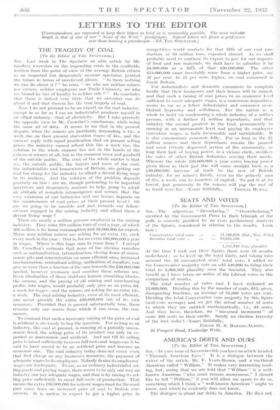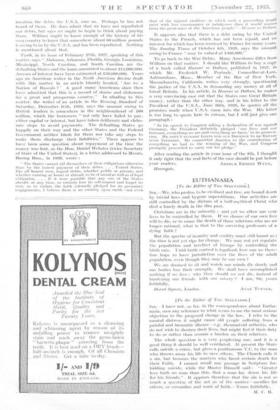AMERICA'S DEBTS AND OURS
[To the Editor trf THE SPECTATOR.]
your issue of November 8th you have an article headed " Through American Eyes." It is a dialogue between the writer of the article, Mr: F. Yeats-Brown, and a -mythical American called " William." It 'makes very interesting read- ing, but, seeing that we are told that "William" is a well- known American " who must remain anonymous," I should like to tell " William," if you will allow me space to do so, something which I think a " well-known American " ought to know, and which he evidently does not know.
The dialogue is about our debts to America. He does not mention the debts the _U.S.A. owe us. Perhaps he has not heard of them. He does admit that we have not repudiated our debts, but says we ought to begin to think about paying them. William ought to know enough of the history of his own country to knowl hat somewhere about 60 million pounds is owing to us by the U.S.A. and has been repudiated. Nothing is mentioned about that.
Truth, in its issue of February 27th, 1927, speaking of this (natter, says " Alabama, Arkansas, Florida, Georgia, Louisiana, Mississippi, North Carolina, and South Carolina arc the defaulting States and the loans amounted to about £15,000,000. Arrears of interest have been estimated at. £50,000,000. Years ago an American writer in the Mirth American. Review dealt with this matter in an article bluntly headed, Are we a Nation of Rascals ? ' A good many Americans since then have admitted that this is a record of shathe and dishonour • for a' great and prosperous country." In alluding-to this matter, the writer of an article in the Evening. Standard of Saturday, December 10th, 1932, says the amount owing to British lenders is somewhere in the neighbourhood of • £60
million, which the borrowers " not only have failed to pay, either capital or interest, but have taken deliberate and elabo- rate steps to avoid payments. The defaulting States go happily on their way and the other States and the Federal Government neither blush for them nor take any steps to make them discharge their liabilities." There appears to have been some question about repayment at the time the money was lent, as the Hon. Daniel Webster (twice Secretary of State of the United States), in a letter addressed to Messrs. Baring Bros., in 1839, wrote :
" The States cannot rid themselves of their obligations otherwise than by the honest payment of their debts. . . . United States, like all honest men, regard debts, whether public or private, and whether existing at home or abroad, to he of moral as well as of legal obligation. . . • If it were possible that any one of the States should, at any time, so entirely lose its self-respect and forget its duty as to violate tho faith solemnly pledged for its pecuniary engagements, I believe there is no ,country upon earth—not even that of the injured creditor—in which such a proceeding would meet with- loss 'countenance or indulgence than it would receive from the great mass of the American people."—Honour or Maas.
It appears also that there is a debt owing by the United States to the French, which has not been repaid, and no interest for which has been received by France for many years. The Sunday Times of October 8th, 1929, says the amount
owing to France " may be valued at £466,000." •
To go back to the War Debts. Many Americans differ from William on that matter: I sliould like William to buy a copy of a book called Honour or Dollars, published in 1927, ill which Mr. Frederick W. Peabody. Counsellor-at-Law, 'Ashburnham, Mass., Member, of the Bar of New York, Massachusetts, California, Writes very strongly, questioning the justice of the U.S.A. in demanding any money at all of 'Great Britain. In his article, in honour or Dollars, he makes a very convincing case out that the States owe Great Britain Money, rather than the other Way. and in his letter to the
President of the U.S.A.; June 30th, 1926; he quoteS all the promises Made when U.S.A. came into the War. His letter
is too long to quote here in ea'teuso, but I will just giVe one paragraph : " In Ins ,speech to Congress asking a declaration of war against Oermany, the President -definitely pledged ' our lives and our fortunes, everything we are and everything we have,' to its prosceu- iGII. HE DIDN'T SUGGEST LOANS FOR OUR DEFENCE TO BE REPAID WITH INTEREST. Ho committed America to the contribution of everything we had to the winning of the War, and Congress promptly proceeded to carry out his pledge."
After reading the article in your issue of the 8th, I thought it only right that the real facts of the case should be put before































































































 Previous page
Previous page